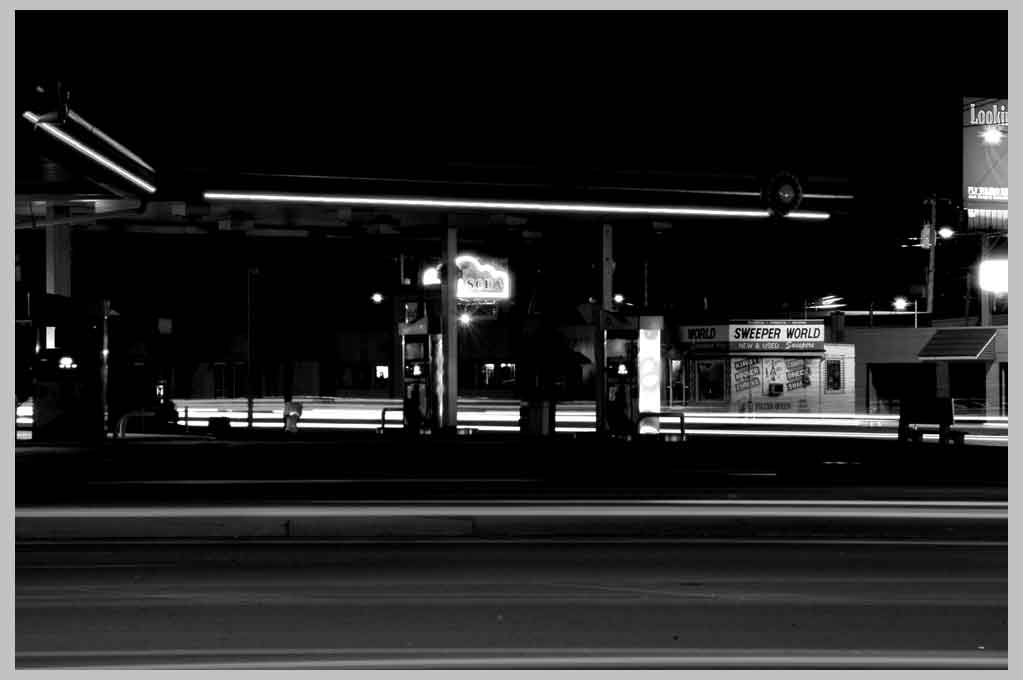

NIGHT STATIONS . . . [ click photo for next . . . ]


NIGHT STATIONS . . . [ click photo for next . . . ]
ON DEATH AT A DISTANCE
"The world is not dangerous because
of those who do harm but because of
those who look at it without
doing anything" Albert Einstein
Poetry, like music, is movement. A movement of sound
and meaning. What we call form is the outward envelope
or shape of this movement, which carries the sound
and the meaning like a wave carries water.
In perception shaped by the current metaphysical and
cultural bias, both Music and Poetry are dominated by
the sense of sight. I visualize this as a very limited,
dark, bandwidth drawn about the eyes, almost like a pair
of blinders. This means, generally, that we as a culture
pay more attention to how the flow of sounds we call music
and poetry is written down, than how it actually sounds as
a living movement.
Thinking of form as movement can be liberating, I think. One
of the many species of movement I'm keenly interested in is
a poetry with a longer, narrative, matter of fact style,
consistently understated, composed of short phrases always
articulated by pauses of almost equal duration. It is a kind
of movement I first encountered in the work of the late Harold
Pinter. For me, it works with meaning which is too ugly, too
brutal, too appalling for words.
Too appalling for words. Yes. Like the current U.S.
government's enthusiastic use of drones.
In my view, anyone with any sense of history instantly
associates drones with the deadly WWII V2 rockets developed
by Werner von Braun and built in the underground hell of
Peenemünde. Thomas Pynchon in Gravity's Rainbow was the
first to focus on this theme in literature. But his self-
consciously overly complicated work evoked nothing like the
horror I experienced upon watching a Dutch documentary,
produced by the VPRO and Andere Tijden, which lets
survivors of the rocket hell-factories, also in a
remarkably point-of-fact, unemotional style, tell their
own stories. [SEE: Andere Tijden, Kamp Dora ]
Unlike Aristotle, I do not believe that war can ever be
justified. This is especially so in the current era. So
I do not believe in, nor do I wish to participate in, any
kind of glorification of it. At the same time, the instrument
of violence which is the drone takes the violent use of force
to a completely new level. It is the cowards instrument of
choice. What does he have to loose? Nothing. It is the
instrument of "clean death" so sought after in an age which
prefers not to get dirty even growing its own food.
But from the compassionate angel's point of view, it is
obvious that the U.S. dominance in this first chapter of
easy-chair video-game warfare shall not last for long. That
is, if we citizens of the blue planet of peace simply sit
back as obsequious drones ourselves, and allow it to continue.
For higher still, I'm quite sure the good goddess Nemesis will
eventually restore balance and truth, and call to account, as
she always has, those who in their hubris now terrorize the
heavens of lands they have never set foot in, in lands they
have never seen.
On the road in American Northwest.
DEATH AT A DISTANCE—a narrative poem . . .
The missile slammed into the glass as if outside of time.
Cheers went out of the filthy, windowless, cubicle,
littered with tea cups and comic books
like a dam of frustration burst by a sudden rush of joy.
The young man was shaking and calling out ecstatically.
They got ‘em. They got ‘em.
The operator knew this was his moment.
He took a marker and scratched out the name.
A second drone gave details.
A restaurant in Chicago: A party for his child.
He would always consult the Oracle
before a mission: in the middle of the night,
it said, Ch’ien. “Modesty,” he thought?
“Modesty.”
The restaurant was utterly destroyed.
He was trying hard to make out the models of cars.
Some were on fire.
There were people screaming, running chaotically in all directions.
Terror without sound.
Other operators were entering the filthy, windowless, room.
Laughter. Asking about the red convertible with the top down.
One knew all the names, even how to pronounce them.
Ch’ien, he thought.
He handed the note to an officer.
They got ‘em. D e s t r o y e d.
The President was only at the third hole.
He read the note. And then handed the note back to the officer.
He then drove a perfect shot straight down the fairway.
He learned to love the game while still a student in Miami..
It made him feel, he couldn’t quite say, feel good inside.
Terror without sound.
Death at a distance.
Terror without sound.
THE LITTLE CLAVIER
please preview
[opens in new window]
| download mp3 DEATH AT A DISTANCE |
